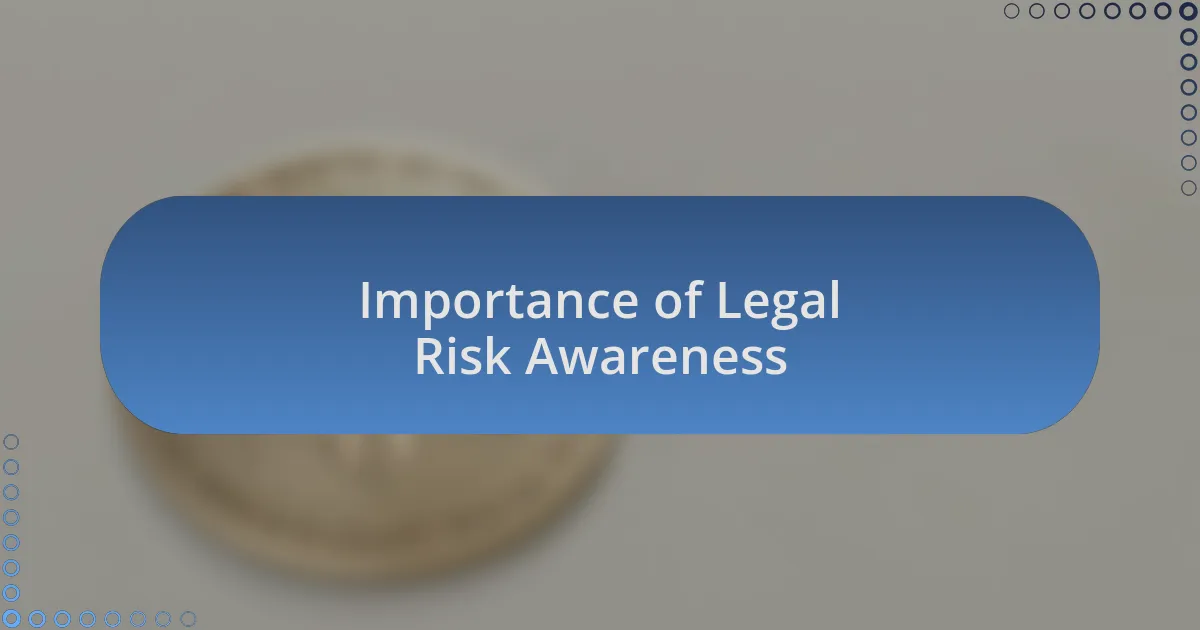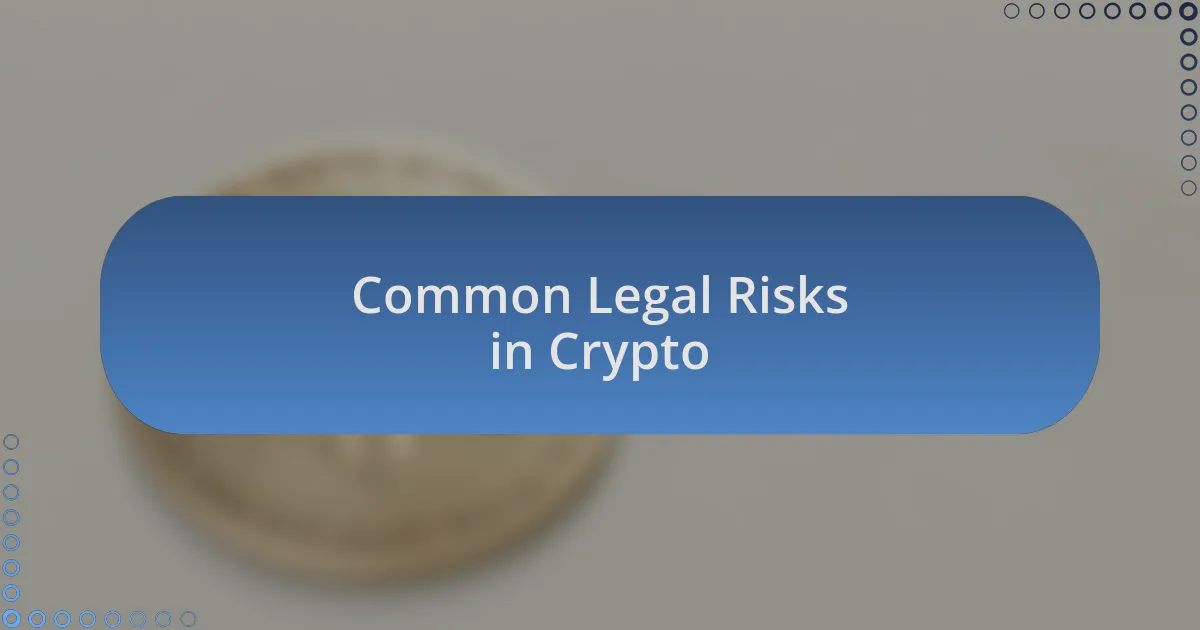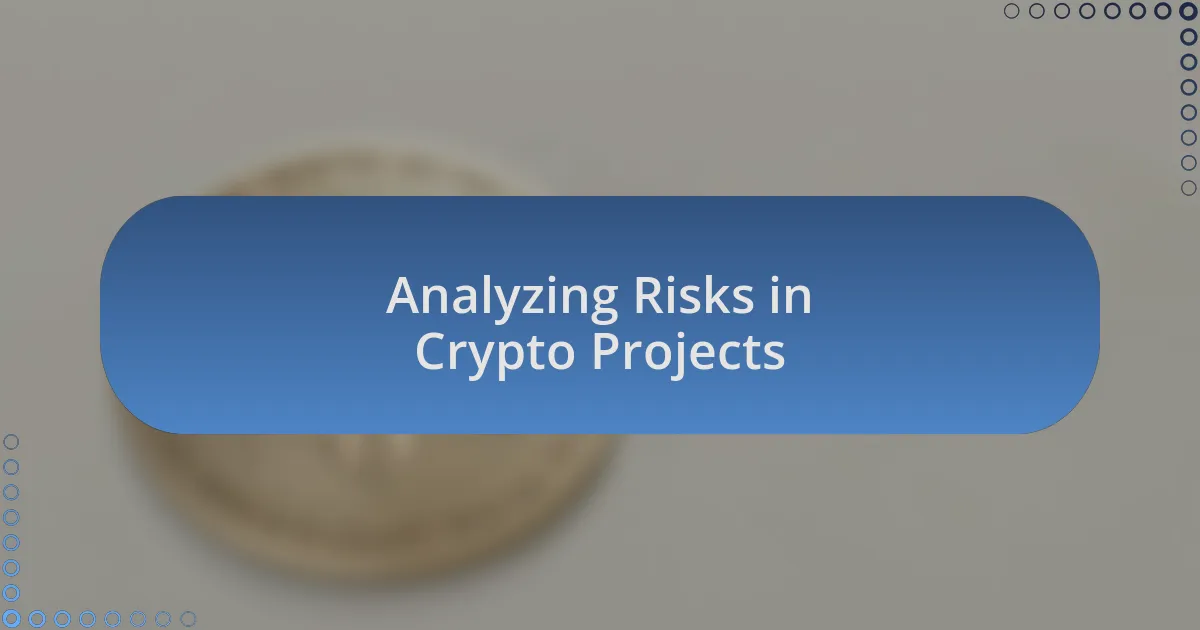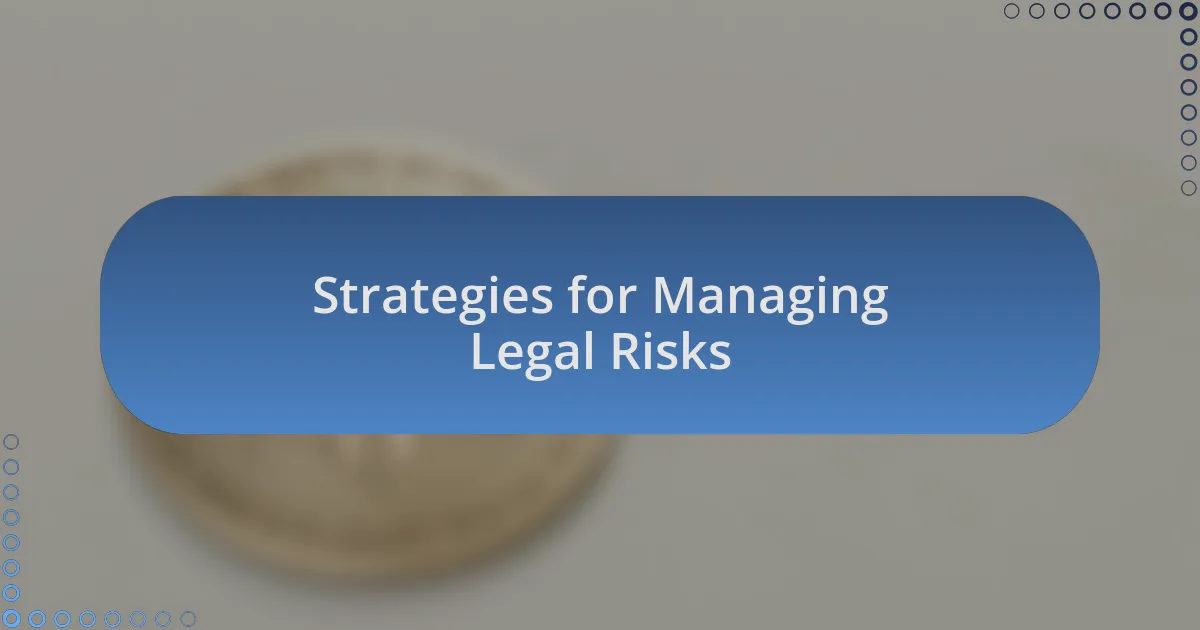Key takeaways:
- Legal risk awareness is crucial for safeguarding investments in cryptocurrency and maintaining community trust amid regulatory changes.
- Common legal risks include misclassifying tokens as securities, varying global regulations, and intellectual property issues, necessitating thorough due diligence.
- Implementing robust compliance protocols and engaging with specialized legal counsel can significantly mitigate legal risks in crypto projects.
- Transparency, diligent record-keeping, and fostering a culture of learning from mistakes are essential practices for navigating legal challenges effectively.

Importance of Legal Risk Awareness
When I first started navigating the world of cryptocurrency, I quickly realized that legal risks were lurking around every corner. It was a daunting realization. Have you ever considered how an unexpected regulatory change could derail your plans overnight? Being aware of legal risks isn’t just about compliance; it’s about safeguarding your investments and maintaining trust among your community.
I remember attending a conference where a speaker shared a cautionary tale about a startup that failed to comply with emerging regulations. Their promising project crumbled when faced with hefty fines and legal battles. This experience drove home the importance of staying informed—not just for oneself, but for the entire ecosystem. When we ignore legal risks, we risk not only our assets but also the credibility of the entire crypto space.
Embracing legal risk awareness means actively engaging with changes in regulation and understanding their potential impacts. I often find myself reading legal briefs or consulting with experts to better grasp what these changes mean. This proactive approach can turn a daunting landscape into a more navigable one. What steps are you taking to ensure that legal considerations are part of your strategy?

Common Legal Risks in Crypto
The landscape of cryptocurrency is fraught with legal risks that can catch even the most seasoned investors off guard. For instance, many projects inadvertently classify their tokens as securities, triggering a complex web of regulations and potential penalties. I remember discussing with a fellow crypto enthusiast whose ICO faced scrutiny because they didn’t properly disclose critical information—an oversight that led to significant legal headaches and lost investor confidence.
Another common legal pitfall arises from the lack of clarity in global regulations. As I connected with international investors, I was struck by how differing legal interpretations can place companies in jeopardy. When I first tried to launch a decentralized application, I had to navigate a maze of local laws, which led to sleepless nights worrying about compliance. It’s crucial to ask: How well do you understand the regulations in your jurisdiction, and are you prepared to adapt?
Furthermore, intellectual property issues are often overlooked in the crypto space. I once collaborated on a project that used an open-source code base, only to find ourselves entangled in a dispute over licensing rights. This experience highlighted the importance of having a solid legal framework and clear agreements in place. What have you done to protect your intellectual property, and are you aware of the risks associated with using third-party technologies?

Analyzing Risks in Crypto Projects
When analyzing risks in crypto projects, I believe it’s essential to dive into the regulatory environment, as it can evolve quickly and unexpectedly. I remember a moment when a project I was monitoring made a major announcement that altered their compliance approach overnight. It left many investors rattled, raising questions about their ability to stay ahead of the shifting legal landscape. How often do you check for updates on regulations?
Another critical aspect involves assessing the project’s team and their track record. In one case, I got involved with a startup that promised groundbreaking technology but was led by individuals with questionable backgrounds. This experience made me keenly aware of how crucial it is to evaluate the legitimacy and expertise of team members. Who is behind the project, and do they have a history of integrity?
Lastly, I can’t emphasize enough the importance of conducting thorough due diligence on partnerships and collaborations. I once partnered with a company that seemed reputable but had hidden conflicts of interest, which created a ripple effect of trust issues later on. It reinforced my belief that understanding the ecosystem around a crypto project can protect you from unforeseen pitfalls. Have you ever considered how a partner’s reputation can impact your own investments?

Strategies for Managing Legal Risks
When it comes to managing legal risks in crypto projects, implementing robust compliance protocols is non-negotiable. I recall working with a project that prioritized compliance by employing legal experts to review their token offerings. Their commitment to following regulations not only protected them from potential legal trouble but also inspired investor confidence. Have you ever wondered how much a solid compliance strategy can impact a project’s credibility?
Another effective strategy involves staying informed about the ever-changing regulatory landscape. I remember attending a seminar where a regulatory expert discussed recent updates that could dramatically affect crypto businesses. It was eye-opening; I realized that a single session could equip me with insights that prevents missteps and costly penalties. How often do you engage with industry experts to stay ahead of the curve?
Additionally, engaging with legal counsel tailored specifically to the crypto industry can be incredibly beneficial. In a previous project, we had regular consultations with a crypto-savvy lawyer who provided invaluable insights into our operations and partnerships. This proactive approach saved us from engaging with non-compliant entities, reminding me that having the right legal support can be a game-changer in navigating potential risks. Have you explored the benefits of having specialized legal advisors on your team?

Lessons Learned from My Experience
One of the key lessons I learned is that transparency is paramount in mitigating legal risks. I once collaborated with a startup that maintained an open line of communication with their users regarding compliance measures. This honesty not only built trust but also encouraged users to actively engage with their practices, creating a community that felt involved and informed. Have you considered how being transparent could transform the way your audience perceives your project?
Another important realization was the significance of diligent record-keeping. In my early days in the crypto space, I occasionally overlooked documentation during fast-paced project developments. However, I once faced a situation where a lack of records led to unnecessary complications in a regulatory audit. The stress of scrambling to find missing documents taught me that being organized is not just administrative; it can save time, money, and headaches down the line. How prepared are you when it comes to tracking your project’s compliance-related documents?
Finally, I discovered that learning from past mistakes is invaluable. I was part of a team that misinterpreted a government directive, leading to compliance issues that could have been avoided. Those moments of discomfort pushed me to create a culture of continuous learning within my teams, encouraging us to analyze failures rather than shy away from them. Have you created an environment where learning from mistakes is embraced rather than feared?